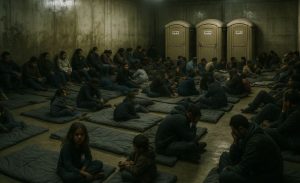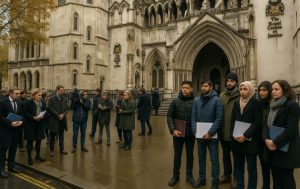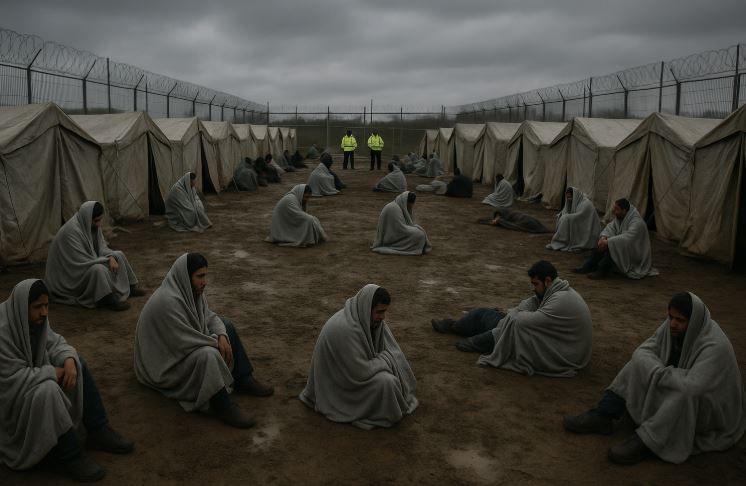Hundreds of asylum seekers have taken legal action against the UK government, raising alarming questions about their treatment at the controversial Manston processing centre in Kent. Their claims, supported by human rights organisations and legal experts, describe harrowing conditions that many believe breached basic human rights.
Why Are Migrants Suing the UK Government?
Nearly 200 asylum seekers are suing the UK government over what they claim were inhumane and unlawful conditions at the Manston immigration processing centre.
The facility, meant to hold people for no more than 24 hours, became a site of prolonged detention, overcrowding, and neglect. The keyword “migrants sue government” has become a legal reality, not just a headline.
These individuals allege that their basic rights were violated, including being held unlawfully for extended periods, often in unsanitary and dangerous conditions.
What Conditions Were Reported Inside Manston Centre?

According to claimants and independent reports, the conditions inside Manston were overcrowded and unsanitary. In late 2022, the facility reportedly held up to 4,000 people, more than three times its intended capacity.
Asylum seekers were forced to sleep on floors with minimal bedding, in tents lacking proper ventilation or privacy.
Some migrants were detained for several days, despite legal guidelines suggesting no more than 24 hours of processing time.
How Were Disease and Abuse Linked to the Centre?
Manston has been connected to outbreaks of diphtheria and scabies, with at least one death potentially linked to the poor health conditions. Several detainees reported a lack of access to proper medical care, while hygiene facilities were described as inadequate.
Disturbingly, there were also allegations of sexual assault, physical violence, and racist abuse from staff and security personnel. Some detainees reportedly attempted to self-harm using barbed wire, reflecting the severity of their distress.
Were Human Rights Breached in the Manston Facility?
Lawyers representing the asylum seekers believe the government’s failure to provide safe and legal standards in Manston amounts to a breach of the European Convention on Human Rights.
The cases argue that the extended detention and neglect of basic needs violated rights to liberty, freedom from inhumane treatment, and dignity.
A spokesperson for one legal firm said:
“Many of these individuals were detained without lawful justification, in degrading and dangerous environments that no human should experience.”
How Much Could the UK Government Be Forced to Pay?

Legal experts suggest that each migrant might be entitled to £500 or more per day of unlawful detention, not including aggravated damages. If courts rule in favour of all 200 claimants, the total compensation could exceed several million pounds.
This follows a precedent where a migrant held at Brook House detention centre was awarded over £200,000 after being detained for three months in similarly poor conditions.
What Is the Government’s Response to the Claims?
The Home Office has yet to respond to all the individual lawsuits but maintains that efforts have been made to improve conditions and reduce overcrowding.
Officials argue that the high volume of arrivals in 2022 overwhelmed the system, but critics say this doesn’t justify the treatment that followed.
Government sources claim reforms are underway, though rights organisations insist that accountability must come before policy adjustments.
Where Is Manston and Why Was It Used for Migrant Processing?
The Manston site, a former RAF base located in Thanet, Kent, was repurposed in 2022 as a short-term immigration holding facility. It was designed to process migrants arriving in small boats across the English Channel, with the expectation of rapid screening and relocation.
However, poor planning and lack of infrastructure reportedly turned it into a de facto detention centre, with hundreds trapped in degrading conditions.
Are There Similar Legal Cases Against UK Detention Centres?
Yes, the migrants sue government trend is not limited to Manston. Other detention centres such as Brook House, Yarl’s Wood, and Colnbrook have also faced lawsuits in recent years. Many of these cases have led to substantial financial settlements, increased scrutiny, and demands for immigration detention reform.
Human rights groups are now pushing for systemic changes, not just case-by-case compensation.
What Happens Next in the Manston Lawsuit Case?

Legal proceedings are ongoing, with individual hearings expected to take place in the coming months. The outcomes could influence future immigration policies, especially regarding the treatment of vulnerable asylum seekers.
There are calls for an independent public inquiry, similar to the Windrush Scandal review, to fully investigate how such conditions were allowed to develop, and who is responsible.
Could This Legal Action Change the UK’s Asylum System?
If successful, this legal action could lead to lasting reform in how the UK processes and houses asylum seekers.
Campaigners hope it will shift public awareness, reduce the criminalisation of migrants, and bring greater transparency and accountability to the Home Office.
Pressure is also mounting for the government to adopt a more humane, rights-based approach to immigration, especially as global migration trends increase.
Conclusion
The lawsuits against the UK government by migrants detained at the Manston processing centre are a stark reminder of the need for accountability and compassion in immigration policy.
The keyword “migrants sue government” is no longer just a headline, it’s a legal and humanitarian wake-up call.
As the legal process unfolds, it remains to be seen how the UK government will respond, and what changes will be made to ensure such a crisis never happens again.
FAQs
What legal rights do asylum seekers have in UK detention centres?
Both domestic laws and international conventions in the UK protect asylum seekers. These include the right to liberty, dignity, and freedom from inhumane treatment.
How long can someone be held at a processing centre like Manston?
By law, individuals should only be held for 24 hours before being moved to more appropriate accommodation. Many at Manston were held far longer.
Has the Home Office admitted fault in the Manston case?
So far, the Home Office has not admitted liability but has acknowledged overcrowding and committed to improving processing times and facilities.
Are asylum seekers entitled to compensation for unlawful detention?
Yes. Courts can award financial compensation if it’s proven that individuals were detained without lawful justification or in poor conditions.









